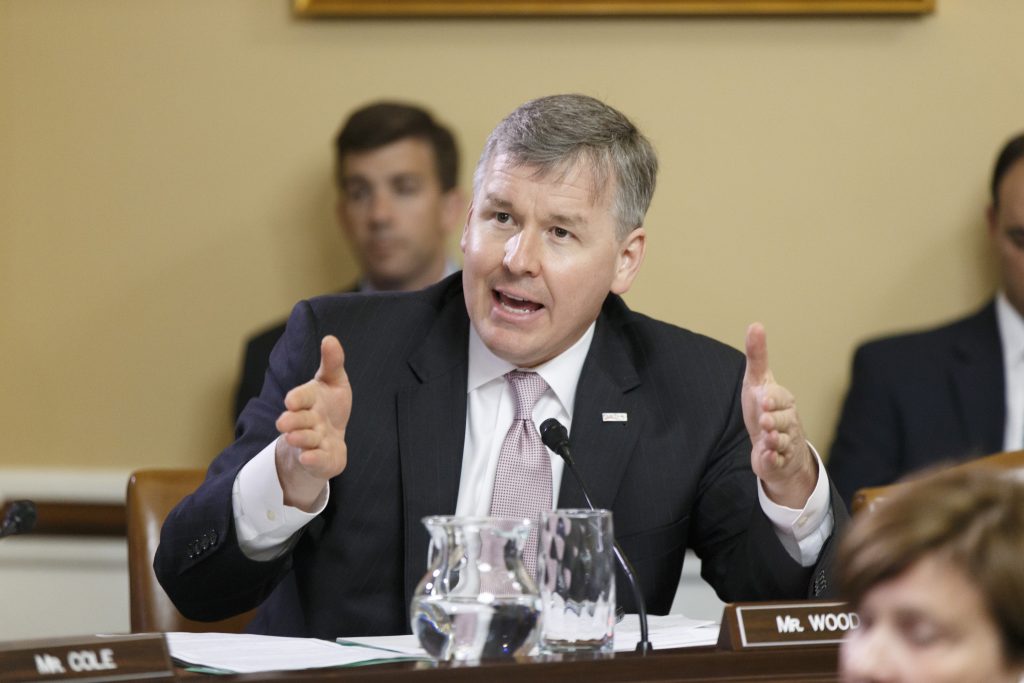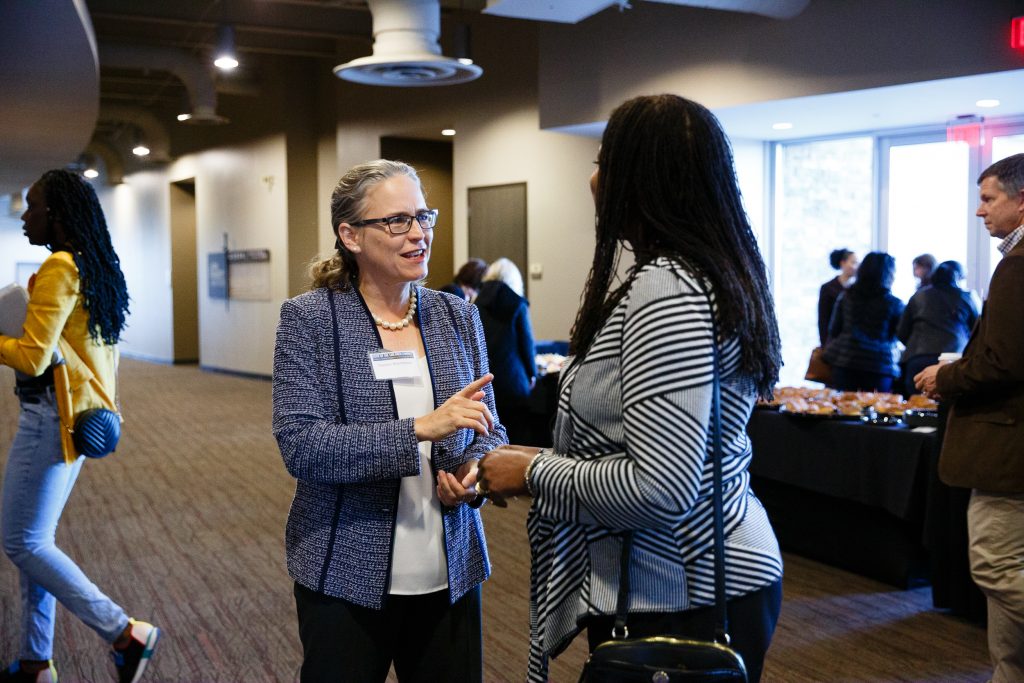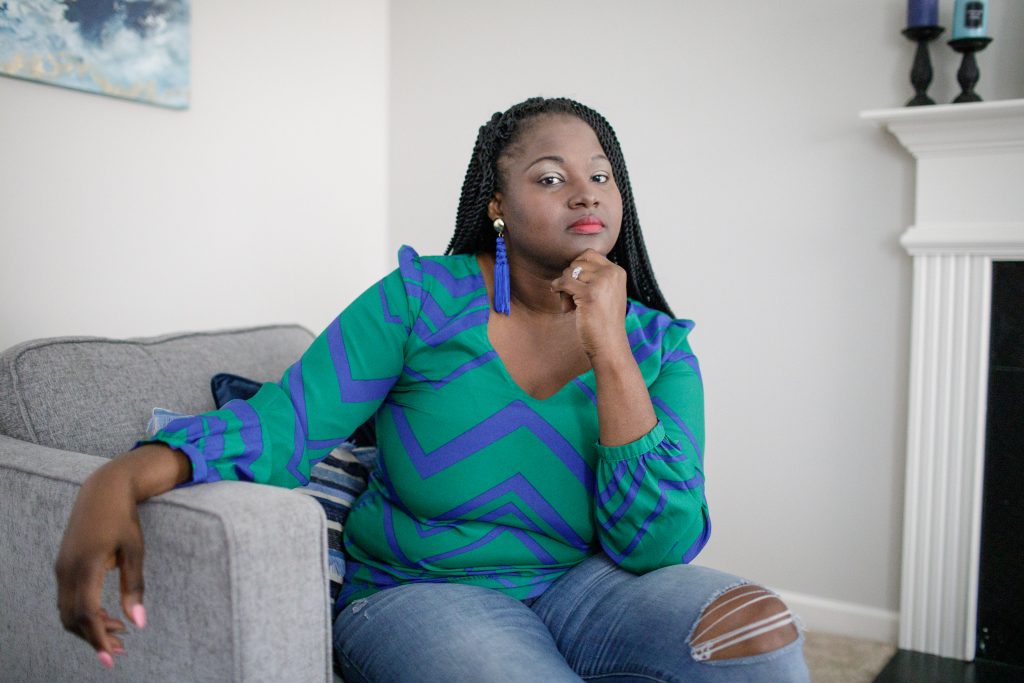Done In By A Deadline

Voter registration deadlines have long been a part of American elections, but an APM Reports investigation finds that they disenfranchised a surprising number of voters in 2018.
Rachel Sender for APM Reports
This story — the first in a two-part series on alleged voter suppression in Georgia — was reported in partnership with APM Reports.
They knew it was going to be close. In 2018, Republican congressman Rob Woodall was running for reelection in Georgia’s 7th Congressional District, a once reliably conservative slice of suburban Atlanta that was quickly changing. A growing number of middle-class African Americans, Asians and Latinos, who typically favor Democrats, had moved into the district in recent years, and the race between Woodall and his Democratic challenger, Carolyn Bourdeaux, was increasingly viewed as a toss-up. In the end, Woodall won by just 433 votes, or 0.15 percent — the closest House race in the country.
What concerned many Democrats were the votes that hadn’t been counted. They viewed Gwinnett County, which makes up a majority of the district, with suspicion because Republicans had managed to maintain power despite an increasingly diverse electorate. In the weeks before the election, an Atlanta Journal-Constitution story dubbed the county “ground zero in the fight over alleged voter suppression in Georgia.”
Immediately after the election, Democrats speculated that voter suppression tactics had aided Woodall. Voters had waited for hours at the polls on Election Day, and those problems were most acute in parts of the district with more voters who are people of color. Election officials had also thrown out absentee ballots at far higher rates than most other parts of the state. Bourdeaux’s campaign began examining discarded ballots and calling people whose ballots had been rejected to let them know they could still verify a signature or show an ID to have their votes counted. “I did think I had a good chance to win,” Bourdeaux recalled. Except the discarded ballots couldn’t account for her loss. A recount actually added a handful of votes to Woodall’s margin. Bourdeaux eventually conceded the race, and Woodall went off to Congress for a fifth term.
But there was one little-discussed election rule that had disenfranchised thousands of people in the 7th District, throughout Georgia and in states across the country in 2018. This rule hadn’t just barred people from voting on Election Day; it had disenfranchised them four weeks earlier.
Deadlines for people to register to vote have long been an accepted part of American elections and aren’t typically mentioned alongside voter ID laws and purges, which Democrats contend are voter suppression tactics. But an APM Reports investigation has found that 87,000 Georgians were barred from voting in 2018 because they’d registered after the deadline.
National experts who have studied the issue say that registration deadlines don’t necessarily make elections more secure, as proponents claim, but they are a useful tool for preventing people from voting, especially those who don’t follow politics closely. Georgia has one of the strictest deadlines in the country; if you want to vote on Election Day, you must register at least 29 days in advance.
APM Reports found that 5,900 people in the Georgia 7th registered to vote in the 29 days before the election, meaning they’d missed the deadline and couldn’t vote in 2018, according to records from the Georgia Secretary of State’s office. While not all of them would have necessarily made it to the polls on Election Day, the number of potential voters who didn’t even have a chance to cast a ballot was nearly 14 times the margin of victory in the race. A disproportionate number of those potential voters were people of color or young voters, groups that typically favor Democrats.
An APM Reports analysis found that a majority of those 5,900 voters who registered after the deadline lived in Democratic-leaning precincts. If they had voted for Democrats and Republicans at the same percentage as everyone else in their precincts — essentially voting the same way their neighbors did — then Bordeaux would have gained an estimated 383 more votes than Woodall.
That would have narrowed Woodall’s margin to a mere 50 votes, out of 280,000 ballots cast, a virtual tie.

The same isn’t true for Georgia’s high-profile governor’s race between Republican Brian Kemp and Democrat Stacey Abrams. If all 87,000 Georgians who registered after the deadline had cast a ballot in 2018, Kemp likely would still have prevailed.
Nationwide, APM Reports found that the 17 states with the strictest registration deadlines last fall — between 28 and 30 days before Election Day — had, on average, lower voter turnout.
Those states could have a huge impact on the 2020 presidential election. That’s because many of the states with the strictest deadlines are considered battleground or swing states. Among them are Florida, Pennsylvania, Arizona, Texas, Georgia and Ohio, which account for 132 of the 270 total votes needed to win the Electoral College.
“They are holding the key to the national election,” says Robert Alexander, a political science professor at Ohio Northern University who has written extensively on the modern politics of the Electoral College system.
Registration deadlines arose two centuries ago to ensure that election officials had time to verify people’s eligibility. In recent years, a growing number of states have decided an early deadline is no longer necessary and have turned to Election Day registration to encourage higher turnout.
But Election Day registration has met fierce opposition in Congress, where proposals to abolish registration deadlines nationwide have failed to gain traction, and in Republican-controlled states like Georgia, where more than a dozen related proposals have died in the Legislature in recent years.
Proponents of earlier deadlines, who tend to be Republicans, have pushed them as an important protection against voter fraud. Opponents, largely Democrats, see them as a voter suppression tactic that disenfranchises their base. Registration deadlines receive far less attention than voter ID laws, redistricting and voter purges, but the APM Reports investigation found that their impact is far greater than most voters probably realize.
Registration deadlines present one of the biggest obstacles to voting, Alexander says. “A significant part of the electorate makes up its mind on the day of the election,” he adds. “What’s important is that people who want to go to the polls should be able to.”

Stricter deadlines, fewer votes
Deadlines for Americans to register to vote were first adopted in Massachusetts at the turn of the 19th century, then spread to most parts of the country over the next hundred years. Proponents argued that the laws were a safeguard against voter fraud. Critics, however, suspected that there was an ulterior motive.
Harvard historian Alexander Keyssar concluded in his 2000 book, “The Right to Vote: The Contested History of Democracy in the United States,” that there was some truth on both sides of the debate. “[I]t can be said with certainty that registration laws reduced fraudulent voting,” he wrote, “and that they kept large numbers (probably millions) of eligible voters from the polls.”
In the South, the rules codified a widespread disenfranchisement of black voters, and in the North, they contributed to suppressing the political power of immigrants and the working poor.
In 1973, the U.S. Supreme Court affirmed states’ rights to impose such deadlines. In that case, Marston v. Lewis, the high court ruled that Arizona’s 50-day deadline was “necessary to permit preparation of accurate voter lists.” Two decades later, Congress capped registration deadlines at 30 days before a federal election through the National Voter Registration Act of 1993.
With technology making it easier for election officials to quickly verify applicants and update voter lists, a growing number of states have relaxed their deadlines in recent years. Since 2018, the number of states that allow Election Day registration has grown by nearly 50 percent, according to research by the National Conference of State Legislatures. It’s currently in place in 21 states and the District of Columbia.
“In the old days, states could say that they needed to have earlier deadlines because it was a more difficult process to manage,” says Barry Burden, a political science professor who heads up the Elections Research Center at the University of Wisconsin-Madison. “But other states have proven that they don’t need 30 days.”
When states implement Election Day registration, more people vote. Of the 10 states with the highest turnout last fall, seven allowed people to just show up and vote regardless of their registration status on Election Day, according to data compiled by the nonprofit United States Elections Project. Meanwhile, five of the 10 states with the lowest turnout had the earliest registration deadlines (28 to 30 days before Election Day), the research shows.
Giving voters a chance to register and vote on the same day helps people who haven’t paid attention to the election until the final weeks, experts say. It also allows voters to fix registration mistakes or administrative errors that would otherwise prevent them from casting a ballot.
But a couple of states have defied the national trend by making it even harder for people to register and vote as Election Day nears.
In North Carolina, lawmakers repealed same-day registration in a 2013 omnibus bill that voting-rights advocates dubbed the “monster law.” Opponents argued that the bill unfairly targeted younger and nonwhite voters, and a federal appellate court agreed that the legislation targeted African Americans “with almost surgical precision.” The courts ultimately upheld same-day registration only during a limited early voting period; North Carolinians still can’t register and vote on Election Day.
As the North Carolina lawsuit was playing out, Carroll College Political Science Professor Alex Street showed just what was at stake. An analysis of web searches for voter registration information estimated that nearly 1.1 million more people in Arizona, Florida, Georgia, Ohio, Pennsylvania and Texas alone would have registered to vote in the 2012 general election if those states would have extended their registration deadlines to Election Day.
In Georgia, state data shows that many motivated voters took explicit steps to register last fall, even after the deadline. On Election Day alone, officials processed more than 3,900 new online applications. And an additional 1,100 new registration applications were filed at polling places. If Georgia allowed Election Day registration, those people would have had a chance to vote.
Turning out and turned away
In Georgia’s 7th Congressional District, interest in last fall’s election was high. The number of voters who cast ballots was up more than 60 percent over the 2014 midterm.
Democrats were trying to recapture the U.S. House for the first time in eight years, and Woodall’s seat was one they hoped to flip, especially in a quickly diversifying district in which people of color now make up 45 percent of registered voters. (The race of 14 percent of voters is labeled “unknown” in state data.)
One of those new residents was Michelle Cofer, a 40-year-old African-American businesswoman who showed up to vote at Ferguson Elementary in Lawrenceville, Gwinnett’s county seat, to find a long wait. She snapped a picture of herself and posted it on Facebook with a caption: “This line. … OMG … I’ve never had to wait this long for voting … EVER. Already 20 minutes in.”
The polling place was chaotic, Cofer said, and she watched the line continue to grow behind her. Volunteers handed out snacks to keep irritable voters from giving up, but she saw some people leave after they saw the length of the line to vote.
After two-and-a-half hours, Cofer finally reached the front of the line just as the polls were about to close. Then she learned there was a problem. A poll worker couldn’t find her on the county’s voter list. Cofer was miffed. “I was getting the correspondence [in the mail] … reminders to go vote,” she recalled recently while standing outside the polling place. “So I never thought I wasn’t registered here.”
Her recent move had caused a problem with her registration. Georgia law requires that voters be registered in the county in which they live. In a state with 159 counties — the Atlanta metro area alone has 10 counties — moving even a short distance across town requires someone to update their registration and can lead to someone being removed from the voter list.
Cofer was now out of options. It was too late to drive back to her old precinct. When a poll worker offered her a provisional ballot, she decided to take it. (Provisional ballots are typically given to people who can’t meet the voting requirements; officials will later examine them and determine if they should be counted.) She also updated her voter registration on the spot.
On Election Day alone, 978 people registered to vote in the 7th District, an analysis of state records shows. That was five times the daily average number of people who registered that year. Sixty-three percent of those Election Day registrants were people of color — a rate nearly 20 percentage points higher than their share of the electorate.
The day after the election, a Facebook ad caught Cofer’s attention. It warned provisional voters to double check to make sure their ballots were counted, and she became curious about what happened with hers.
On Nov. 8, a clerk told her it was still too soon to tell because the ballots were being manually counted. County election officials decided to extend their office hours that day to give voters like Cofer more time to show documents that would help verify their eligibility.

In the end, her ballot was rejected. For Cofer, the whole experience — the long lines, the runaround from election officials, the racial tensions — left her feeling targeted.
“I stood in line and waited diligently. I cast the vote as I was instructed. I did a follow-up as I was instructed,” she said. “So, I’m not taking ownership for [my vote] not counting,”
The 7th District race was still in flux when days later, on Nov. 13, Cofer attended a Gwinnett Election Board meeting to voice her concerns, holding a sign that read, “My vote matters.” She took to Facebook again to voice her frustration. “It’s really not about who won or who lost,” she wrote, “it’s about integrity.”
Republicans shut out, too
Cofer was one of the 87,000 Georgians — citizens in good standing, many of them presumably interested enough in voting to register — who were shut out of the election because they’d missed the deadline, according to state records.
Not everyone who registered was likely to show up at the polls, but the registration surge suggested thousands were motivated by the election. If those people had been allowed to vote, Abrams would likely have gained additional votes but not enough to change the outcome of the governor’s race.
Had those voters cast ballots in line with others in their precincts, Abrams would have picked up an estimated 1,948 more votes than Kemp, the APM Reports analysis. Kemp beat Abrams by about 50,000 votes and avoided a runoff by 17,000 votes.
The deadline presented a particular barrier for younger voters. Those born between 1995 and 2000 accounted for more than a quarter of the 16,230 people who registered on Election Day — far greater than their 10 percent share of the electorate, an analysis of state records shows.
Black, Latino, Asian and other nonwhite voters were also disproportionately affected, accounting for 49 percent of Election Day registrations. That’s nearly 10 percentage points higher than their overall makeup of the state’s voter list.
But not all voters who were locked out of the election would have supported Democrats. If Georgia had Election Day registration, loyal Republican voters like Dave Whitten would have had their votes counted too.

Before Election Day last year, Whitten, a self-described conservative, was visiting his future home on the Georgia coast, where he soon plans to retire. He got a new driver’s license there. That switched his voter registration under a fairly new partnership with the Department of Drivers Services that automatically registers voters unless they opt out. Since the new policies debuted, voter registrations have surged in Georgia.
Unbeknownst to him, Whitten wasn’t signed up in Gwinnett County anymore. He’d voted at the same polling place for 30 years, but when he went there last November, poll workers couldn’t find him on the registration list. “I was just adamant, that I needed to vote,” he says, “and I had always voted here.”
Whitten went ahead and updated his registration back at his same address in Gwinnett County, but it was too late. He wasn’t allowed to vote.
“I was joking that I was suppressed, and I suppose I was, but it was self-inflicted,” he says.
Whitten blames himself for what happened, but he thinks Republicans in the Legislature should pass a law allowing for Election Day registration.
“I believe the vast majority of Republicans and Democrats — citizens of the United States — we believe everybody should vote,” he says. “I would say, ‘Hey let’s do the right thing. If we can do it, then let’s do it.’”
‘In their mind, this is not even worth it’
Many Republican lawmakers in the Georgia Legislature don’t see it that way. More than a dozen recent bills to adopt Election Day registration have failed to pass. Most don’t even get a hearing in committee.
Dee Dawkins-Haigler, a Democratic state representative in Georgia from 2008 to 2017, first set out to change the law in 2014 after hearing stories of people who had registration problems, or didn’t sign up on time.
She knew from experience running her own campaigns that many people don’t pay full attention to an election until it’s almost time to vote. That’s when the commercials and radio ads start popping up, and people are inclined to check their registration status. But if they find problems, it’s too late.
“What if they’re allowed to register at their polling place on Election Day?” she remembers thinking. “So now everybody can come and vote. Which I think the democratic process should be about; everybody should be able to vote, because it is a sacred right.”
The same year she filed her first bill, in 2014, Kemp, as secretary of state and top election official, was investigating voter registration efforts by the New Georgia Project, which at the time was headed by his future gubernatorial opponent, Stacey Abrams. By the eve of the 2014 midterm election, more than 50,000 registrations submitted by Abrams’s organization were missing from the voter rolls, which prompted voting-rights groups to file a lawsuit.
That same year, the Legislature was also considering plans to cut early voting days in local elections, and two majority African-American counties decided to change municipal election dates under a change in state law that the U.S. Department of Justice had previously objected to.
Dawkins-Haigler says that Republicans told her she was exaggerating the problem with the registration deadline and that changing the law would lead to voter fraud.
“It opens up the door for illegal activity,” says Republican Lynn Westmoreland, a former Georgia congressman. “You could have somebody ride through an apartment complex, or just go down the street going, ‘Hey, have you voted? You want 10 bucks? Or you want 20 dollars? Or I’ll give you a ride to the poll … or take you for a dinner.’ Or whatever.”
Burden, the political science professor from Wisconsin, says there are “really compelling” security benefits of Election Day registration. In fact, same-day registration could actually make elections more secure. Bringing the registration process into a public polling place with trained officials, he says, where both political parties are represented, could help prevent the sort of registration fraud that Kemp had accused Abrams of.
Dawkins-Haigler’s bills got assigned to the House Government Affairs Committee, chaired by Republican Ed Rynders. “I just said, ‘Can I get a committee hearing?’ and he laughed, he thought that was funny and then he went on to something else. … It wasn’t a mean laugh, it was just an Ed Rynders laugh, like ‘ha ha’ and you know we just continued talking on to something else, because in their mind this is not even worth it, because one, we’re not going to vote for it, why would we even waste our time.”
Rynders, who recently announced that he’s retiring, declined requests for an interview.
A handful of follow-up bills have been introduced in Georgia’s statehouse since Dawkins-Haigler resigned but she’s not surprised that they’ve all hit a dead end. None of the 14 bills related to voter registration introduced in Georgia since 2012 have had even a single Republican sponsor.
“That is not something that [Republicans] are going to allow to happen under their watch,” she says.
Back in the 7th District, Woodall announced that he’s retiring, and Bourdeaux has announced that she’ll run again for the seat next year. While Bourdeaux says she’s in favor of Election Day registration, she’s running within the state laws that are currently on the books. “[W]e create a lot of artificial barriers,” she says, which leads her to wonder, “Can we really say that the people who are elected are really reflecting what the people want?”








